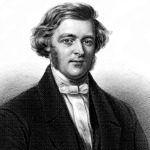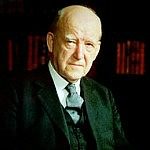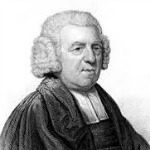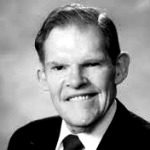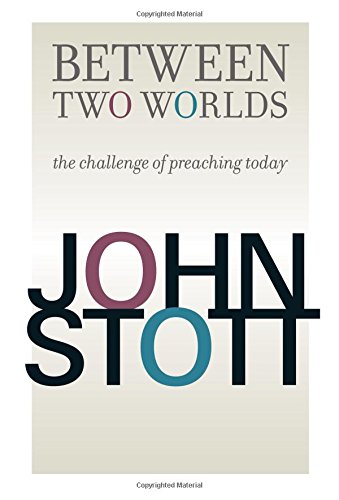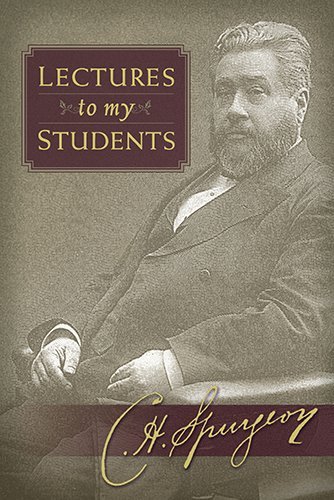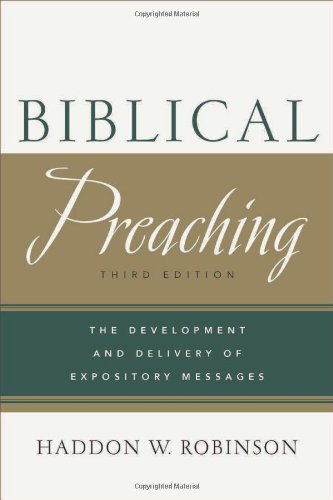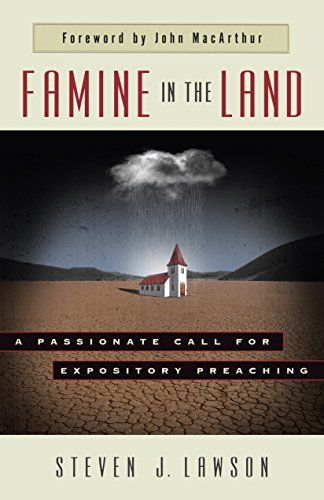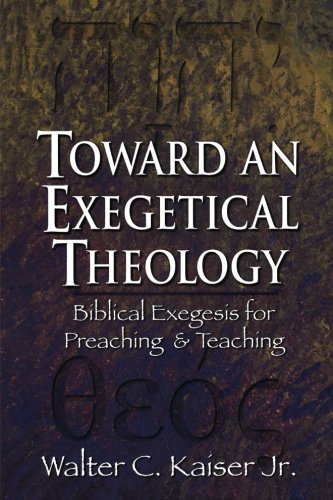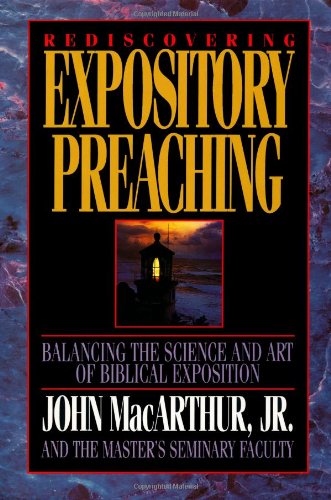Quotes about Preaching-Word
The purpose of reading, explaining and applying a portion of Scripture is to obey the command to “preach the Word.” In no other way may we expect to experience the presence and power of the Holy Spirit in our preaching. He did not spend thousands of years producing the Old and New Testaments…only to ignore it! What He “moved” men to write He now motivates us to preach. He has not promised to bless our word; that promise extends only to His own (Isa. 55:10, 11).
Preaching with a Purpose, Zondervan, 1982, p. 19. Get this book!
Strictly speaking, it may be said that the true preaching of the Word and its recognition as the standard of doctrine and life, is the one mark of the Church. Without it there is no Church.
Systematic Theology, by permission of Banner of Truth, Carlisle, PA. 1998, p. 577. Get this book!
Wherever we see the Word of God purely preached and heard, there a church of God exists, even if it swarms with many faults.
When the fire is stirred up and discovered it giveth more heat than when it is not, so the Word of God by preaching and interpreting maketh a greater flame in the hearts of the hearers than when it is read.
A Puritan Golden Treasury, compiled by I.D.E. Thomas, by permission of Banner of Truth, Carlisle, PA. 2000, p. 222.
Pastors teaching the Word is the core of a church’s discipling ministry. It provides the food and water that feeds all the other discipling relationships within the church.
Discipling, ©9Marks. Website: www.9Marks.org. Email: [email protected]. Toll Free: (888) 543-1030. Used by Permission. Page 60.
Thom Rainer did a study a number of years ago asking formerly unchurched people the open-ended question, “What factors led you to choose this church?” A lot of surveys had been done asking the unchurched what they would like in a church. But this study asked the formerly unchurched why they actually were now in a church. The results were surprising: 11 percent said worship style led them to their church, 25 percent said children’s/youth ministry, and 37 percent said they sensed God’s presence at their church. For 41 percent, someone from the church had witnessed to them, and 49 percent mentioned friendliness as the reason for choosing their church. Can you guess the top two responses? Doctrine and preaching – 88 percent said the doctrine led them to their church, and 90 percent said the preaching led them there, in particular, a pastor who preached with certitude and conviction… When it comes to reaching outsiders, bold, deep, biblical preaching is not the problem. It’s part of the solution.
The Secret to Reaching the Next Generation by Kevin DeYoung taken from Don’t Call it a Comeback, edited by Kevin DeYoung, copyright 2011, Crossway Books, a division of Good News Publishers, Wheaton Illinois 60187, www.crosswaybooks.org, p. 27-28. Get this book!
The virtue lies in the gospel, not in the gospeller; in the exposition, and not in the expounder.
Men-fearing preachers will treat (the Word) so lightly, touch it so gingerly, speak of it so generally, plead it so weakly, believe it so loosely, that the truth is neutralized down to nothing worth getting excited about. Snooze. And the preacher says, “No more doctrinal sermons; they won’t hear them.” How a preacher can use the same Bible that spawned the Protestant Reformation, launched the modern missionary movement, and put his forbears on the block, and never stir up anybody is a mystery to me.
Serious Preaching, Christian Communicators Worldwide, www.CCWtoday.org. Used by Permission.
There are many who have fought hard for the inerrancy of Scripture who don’t sufficiently break open the Bible they fought for.
Serious Preaching, Christian Communicators Worldwide, www.CCWtoday.org. Used by Permission.
In its attempt to win a hearing, the contemporary pulpit has been guilty of depriving our generation of lasting joy. They have had the responsibility of feeding the people craving for solid meat, but perhaps not realizing what they are craving for, they have kept feeding them dessert. It may have given the people instant satisfaction, but it has left them unhealthy and not really able to be salt and light for Christ in this world.
Prophets…declare what God will do and what God requires. They speak the truth that people often do not want to hear. This rubs against the grain of a culture that treats religion as a consumer item. Those who adjust the Word of God to meet market trends, assuming the consumer is always right, are simply peddlers (2 Cor. 2:17). Those who come to religion assuming that the chief goal of God is to glorify humankind and asking, “What will it all get me?” receive only spiritual chaff.
Luke – Exegetical Commentary, Zondervan, www.zondervan.com, 2011, p. 208.|Luke – Exegetical Commentary, Zondervan, www.zondervan.com, 2011, p. 208.
They therefore that ground what they preach upon the Scripture, and deliver nothing but what is agreeable to it, preach the word of God.
It is God’s word that does convert, quicken, comfort, and build up, or, on the other side, wound and beat down. What is the reason that there was so great an alteration made by the ministry of Christ and His disciples, by the apostles and others after them, indeed, by Luther, and other ministers of reformed churches? They did not preach traditions of elders like the scribes; nor men’s inventions like the Roman Catholics do. They preached the pure word of God. The more purely God’s word is preached, the more deeply it pierces and the more kindly it works.
The more purely God’s Word is preached, the more deeply it pierces and the more kindly it works.
If Jesus Christ is the head of the church and hence the source and goal of its entire life, true growth is only possible in obedience to Him. Conversely, if the church becomes detached from Jesus Christ and His Word, it cannot grow however active and successful it may seem to be.
But it is far more common for the evangelical preacher to edit God’s Word: 1. By removing the text from its context, and using it to say what-ever the preacher likes, 2. By moralizing the text, so that it is reduced to an ethical maxim that fits any religion, 3. By using the text to promote hobby-horses, and 4. By dogmatic insistence that the text says things it does not truly say. This homiletical hocus-pocus has subtle roots such as the desire to be clever and popular or synthetically relevant or intellectually respectable or to make the gospel more acceptable. But most often God’s Word gets watered down by the preacher’s laziness. He simply will not do the hard work to engage and preach a text in its context.
Doing Ministry by Kent Hughes taken from 2 Corinthians by Kent Hughes, copyright 2006, Crossway Books, a division of Good News Publishers, Wheaton Illinois 60187, www.crosswaybooks.org, p. 84.
John Broadus (one of the founders of the Southern Baptist Seminary and the author of the most influential book on preaching ever written in America) was lecturing his class just nine days before he died when he paused and said: “Gentlemen, if this were the last time I should ever be permitted to address you, I would feel amply repaid for consuming the whole hour endeavoring to impress upon you these two things: true piety, and, like Apollos, to be men ‘mighty in the Scriptures.’” Broadus then paused and stood for a moment with his piercing eyes fixed upon the class. Over and over he repeated in that slow but wonderfully impressive style that was distinctively his, “Mighty in the Scriptures, mighty in the Scriptures.”
It is no secret that Christ’s Church is not in good health in many places of the world. She has been languishing because she has been fed, as the current line has it, “junk food;” all kinds of artificial preservatives and all sorts of unnatural substitutes have been served up to her. As a result, theological and biblical malnutrition has afflicted the very generation that has taken such giant steps to make sure its physical health is not damaged by using foods or products that are harmful to their bodies. Simultaneously a worldwide spiritual famine resulting from the absence of any genuine publication of the Word of God (Amos 8:11) continues to run wild and almost unabated in most quarters of the Church.
Strangely, church leaders get caught up in all kinds of power for building their churches… But does any power in the universe match God’s power to breathe out worlds or dismiss death simply with words? “Let there be light!” and “Lazarus, come forth!”? No there is nothing like it. Yet this same power is available to the preacher through God’s Word.
Light entertainment, easy familiarity and jocularity are not compatible with a realization of the seriousness of the condition of the souls of all men by nature, the fact that they are lost and in danger of eternal perdition, and their consequent need of salvation. Not only that, such methods cannot bring out the Truth; and our business is to preach the Truth. These methods may affect people psychologically and in other respects, and they may lead to “decisions”; but our object is not merely to get decisions, it is to bring people to a knowledge of the Truth.
Preachers and Preaching, Zondervan, 1971, p. 140-141. Get this book!
Preaching the Word is the primary task of the Church, the primary task of the leaders of the Church, the people who are set in this position of authority; and we must not allow anything to deflect us from this, however good the cause, however great the need.
Preachers and Preaching, Zondervan, 1971, p. 23. Get this book!
Whenever the true message of the cross is abolished, the anger of hypocrites and heretics eases…and all things are in peace. This is a sure token that the devil is guarding the entry of that house, and that the pure doctrine of God’s Word has been taken away. The church, then, is in the BEST state when Satan assaileth it on every side…both with subtle sleights, and outright violence. And (likewise) it is in the WORST state, when it is most at peace!
Certainly God could with His Spirit instruct and justify those whom He would, but it has pleased His wisdom more to instruct and justify those who believe through the foolishness of preaching. The Word is the channel through which the Holy Spirit is given. [There are biblical passages] against those who hold the spoken word in contempt. The lips are the public reservoirs of the church. In them alone is kept the Word of God… Unless the Word is preached publicly, it slips away. The more it is preached, the more firmly it is retained. Reading it is not as profitable as hearing it, for the live voice teaches, exhorts, defends, and resists the spirit of error. Satan does not care a hoot for the written Word of God, but he flees at the speaking of the Word… This penetrates hearts and leads back those who stray.
I simply taught, preached, wrote God’s Word: otherwise I did nothing. And then when I slept or drank Wittenberg beer with my friend Philip of Amsdorf, the Word so greatly weakened the papacy that never a prince or emperor did such damage to it. I did nothing: the Word of God did it all.
Committees are necessary. Even more important is vision and the ability to move the congregation toward the goals of the church. But when push comes to shove, it’s the ministry of the Word that gives us our greatest impact. A church can usually put up with weak administration if it has effective preaching. But there’s nothing quite as pathetic as people coming to church and returning home without any spiritual food.
Pastor to Pastor, Kregel, 1998, p. 104. Get this book!
The preacher needs to realize that God’s Word is not the preacher’s word. He is to recognize himself as a messenger, not an originator (1 Thess. 2:13). He is a sower, not the source (Matt. 13:3, 19). He is a herald, not the authority (1 Tim. 2:7). He is a steward, not the owner (Col. 1:25). He is the guide, not the author (Acts 8:31). He is the server of spiritual food, not the chef (John 21:15, 17).
God’s Word by John MacArthur and Richard Mayhue taken from Biblical Doctrine by John MacArthur and Richard Mayhue, copyright 2017, Crossway Books, a division of Good News Publishers, Wheaton Illinois 60187, www.crosswaybooks.org. Page 133.
If Jesus, the sinless and perfect Son of God, limited Himself to speaking nothing during His incarnation except the truth He received from His Father, how much more should those who have been called into ministry speak only on the authority of divine Scripture.
I think it is the preacher’s responsibility to get attention and comprehension. It is the Holy Spirit’s responsibility to produce yielding, retention, and action – that’s not my job. All the slick techniques, all the gospel marketing packages, all the pulpit histrionics of jumping and stomping and flailing around, and doing whatever they do to create the mood. All the sad stories, the mood music, the endless invitations, the hand raising, the walking to the front, all of that kind of pressure is not preaching the Word. It has nothing to do with comprehension. The decision of yielding, surrendering and then retaining and acting, is between the hearer and God, and not the hearer and the preacher.
Despite what current trends would have us believe, a godly pastor can be ignorant about pop culture and the latest Internet memes. He can be ignorant about psychology and sociology. He doesn’t need to be an expert on world events, social movements, or leadership strategies. Being well versed in movies, music, and sports isn’t part of the job description, either, and is often a hindrance to the actual work of ministry. Rather, a pastor must be an expert in the Bible
God’s people need to be fed out of the overflow of the pastor’s deep study of Scripture – not some scraps he was able to pull together at the last minute. Such weakness in the pulpit leads to weakness throughout the church. Good communication skills may entertain, but they are useless if the pastor is not unleashing God’s Word.
Where the authentic preaching of the Word takes place, the church is there. And where that is absent, there is no church. No matter how high the steeple, no matter how large the budget, no matter how impressive the ministry, it is something else.
Feed My Sheep, ed. Don Kistler, Soli Deo Gloria Ministries, 2002, p. 18. Get this book!
There is only one authority that is the preacher’s authority, and there is only one authority that undergirds and justifies his teaching ministry, and that is the authority of the Word of God. This Word is inerrant, infallible, authoritative, and trustworthy. It is that Word, and that Word alone, that is our authority; and it is not only the foundation, but the substance, the content of our teaching and preaching.
Feed My Sheep, ed. Don Kistler, Soli Deo Gloria Ministries, 2002, p. 28. Get this book!
For at the heart of Christian ministry must always be the molding of people into the image of Christ, and the full and faithful teaching of God’s truth is the means the Spirit uses to accomplish this goal.
I count it my honor and happiness that I preach to a free people who have the Bible in their hands. To your Bibles I appeal. I entreat, I charge you to receive nothing upon my word any farther than I can prove it from the Word of God. And bring every preacher and every sermon that you hear to the same standard.
When God’s Word is being preached, you’re not merely receiving information about God. God Himself is addressing you through His Word Jeff Purswell).
A man may have a charismatic personality; he may be a gifted administrator and a silken orator; he may be armed with an impressive program; he may even have the people skills of a politician and the empathic listening skills of a counselor; but he will starve the sheep if he cannot feed the people of God on the Word of God. Programs and personalities are dispensable. But without food, sheep die. Feeding the flock is therefore the pastor’s first priority. “Feed my lambs” (John 21:15, ESV) (Mark Dever and Paul Alexander).
The Role of the Pastor, taken from The Deliberate Church, © 2005, Crossway Books, a division of Good News Publishers, Wheaton Illinois 60187, p. 94, www.crosswaybooks.org.
God’s Word is His supernatural power for accomplishing His supernatural work. That’s why our eloquence, innovations, and programs are so much less important than we think; that’s why we as pastors must give ourselves to preaching, not programs; and that’s why we need to be teaching our congregations to value God’s Word over programs. Preaching the content and intent of God’s Word is what unleashes the power of God on the people of God, because God’s power for building His people is in His Word, particularly as we find it in the Gospel (Rom. 1:16). God’s Word builds His church. So preaching His Gospel is primary (Mark Dever and Paul Alexander).
The Four P’s, taken from The Deliberate Church, © 2005, Crossway Books, a division of Good News Publishers, Wheaton Illinois 60187, p. 35, www.crosswaybooks.org.
How you preach is what you think about the Scripture (H.B. Charles).
[The preacher’s] aim…will be to stand under Scripture, not over it, and to allow it, so to speak, to talk through him, delivering what is not so much his message as its. In our preaching, that is what should always be happening. In his obituary of the great German conductor, Otto Klemperer, Neville Cardus spoke of the way in which Klemperer “set the music in motion,” maintaining throughout a deliberately anonymous, self-effacing style in order that the musical notes might articulate themselves in their own integrity through him. So it must be in preaching; Scripture itself must do all the talking, and the preacher’s task is simply to “set the Bible in motion.”
Preaching as Biblical Interpretation, in Inerrancy and Common Sense, ed. Roger R. Nicole and J. Ramsey Michaels, Baker, 1980, p. 203.
The great need across evangelicalism is exposition of the Scriptures. I sense there is a departure from that, even amongst some of our own grads who are entertaining the people, giving the people what they want, whereas we are called to teach the Word. It is the Word that is the power of God to salvation; it is the Word that is the power for Christian living, and (the Word should be) the center of their ministry. It may not be popular, it may not build mega-churches, but it will fulfill that to which they are called upon to do in ministry.
The Word of God alone is to be preached, in its perfection and inner consistency. Scripture is the exclusive subject of preaching, the only field in which the preacher is to labour.
It’s true that [many] are praying for a worldwide revival. But it would be more timely, and more scriptural, for prayer to be made to the Lord of the harvest, that He would raise up and thrust forth laborers who would fearlessly and faithfully preach those truths which are calculated to bring about a revival.
When there is a famine of the word of God in the land the spiritual nutrients that enable the eye to spot sin as sin is gone. And the spiritual protein that gives strength the moral muscle of the soul to do what is right is missing. The spiritual eye becomes diseased through malnutrition, and the clear lines between sin and righteousness begin to blur. The moral muscle of the will atrophies, and weakens, and the result is that the beckoning of the world wins because there is no strength to stand against it. When the ministry of the word goes wrong, many are caused to stumble.
Let None be Faithless to the Wife of his Youth, Sermon, Nov. 22, 1987, www.DesiringGod.org, Used by Permission.
The Bible-oriented preacher wants the congregation to know that his words, if they have any abiding worth, are in accord with God’s words. He wants this to be obvious to them. That is part of his humility and his authority. Therefore, he constantly tries to show the people that his ideas are coming from the Bible. He is hesitant to go too far toward points that are not demonstrable from the Bible.
In Honor of Tethered Preaching, September 17, 2008, www.DesiringGod.org. Used by Permission.
Even when preaching the Word of God does not soften and save and heal, it is not necessarily ineffective. This preaching of the Word may be doing God’s terrible work of judgment. It may be hardening people, and making their ears so dull that they will never want to hear again. There is a judgment in this world – not just in the world to come (Romans 1:24) – and oh, how we should flee from it…. Take heed how you hear! Don’t be cavalier in the hearing of God’s Word week after week. If it is not softening and saving and healing and bearing fruit, it is probably hardening and blinding and dulling (see 2 Corinthians 2:16).
From the Sermon: Take Care How You Listen – Part 1, Luke 8:4-18, February 15, 1998, www.DesiringGod.org, Used by Permission.
For the Christian church (even in its recently popular seeker services) to ignore, euphemize, or otherwise mute the lethal reality of sin is to cut the nerve of the gospel. For the sober truth is that without full disclosure on sin, the gospel of grace becomes impertinent, unnecessary, and finally uninteresting.
Preaching means, “to cry out, herald, or exhort.” Preaching should so stir a man that he pours out the message with passion and fervor. Not all passionate pleading from a pulpit, however, possesses divine authority. When a preacher speaks as a herald, he must cry out “the Word.” Anything less cannot legitimately pass for Christian preaching.
The greatest awakening in the history of the church took place when…(preachers) were bold enough to proclaim the Word of God and saw their task to be presenting the unembellished, undiluted, unvarnished Word of God. That is why they pored over the texts of Scripture, being careful of their exegesis before they entered the pulpit. Because that was the center of their task, they were fearless. Their fearlessness, their boldness, their courage came from the conviction that what they were preaching and teaching was the Word of God.
May I beg you carefully to judge every preacher, not by his gifts, not by his elocutionary powers, not by his status in society, not by the respectability of his congregation, not by the prettiness of his church, but by this – does he preach the word of truth, the gospel of your salvation? If he does, your sitting under his ministry may prove to you the means of begetting faith in you. But if he does not, you cannot expect God’s blessing.
God gave me this great book to preach from, and if He has put anything in it you think is not fit, go and complain to Him, not to me. I am simply his servant, and if His errand that I am to tell is objectionable, I cannot help it. Let me tell you, the reason why many of our churches are declining is just because this doctrine has not been preached.
Some of you have never preached on election since you were ordained. “These things,” you say, “are offensive.” And so you would rather offend God than offend man. But you reply, “These things will not be practical.” I do think that the climax of all man’s blasphemy is centered in that utterance. Tell me that God put a thing in the Bible that I am not to preach! You are finding fault with my God. But you say, “It will be dangerous.” What! God’s truth dangerous? I should not like to stand in your shoes when you have to face your Maker on the Day of Judgment after such an utterance as that.
“But some truths ought to be kept back from the people,” you will say, “lest they should make an ill use thereof.” That is Popish doctrine It was upon that very theory that the priests kept back the Bible from the people. They did not give it to them lest they should misuse it. Besides all this, remember that men do read the Scriptures and think about these doctrines and often make mistakes about them. Who then, shall set them right if we who preach the Word hold our tongues about the matter?
I am the messenger. I tell you the Masters message; if you do not like the message quarrel with the Bible, not with me; so long as I have Scripture on my side I will dare and defy you to do anything against me.
What a colossal failure it is for church shepherds to do everything but feed God’s flock. The Bible is the believer’s food. Continual nourishment through the milk and meat of God’s Word is what they need for protection and growth. Loving leaders and teachers will labor diligently to meet that need.
Leading With Love, Lewis and Roth, 2006, p. 127, Used by Permission. Get this book!
All in the church may hear the Word of Christ, but few hear Christ in the Word.
A Puritan Golden Treasury, compiled by I.D.E. Thomas, by permission of Banner of Truth, Carlisle, PA. 2000, p. 317.
Our eyes should never be on the size of our church, the success of our programs, our budget, our salaries, but on speaking the truth of our Lord. Our concern must be the repentance, salvation, and spiritual growth of our hearers. To fear men is to hold God’s Word up for contempt; to fear God is to speak His message truthfully and faithfully.
Practical Wisdom for Pastors, Crossway Books, 2001, p. 130. Used by Permission. Get this book!
We must do God’s work in God’s way, declaring God’s truth on His terms. That calls for trust – an absolute reliance upon God! The modern church often is afflicted by fear – fear of the members, fear of the world, fear of the unknown, fear of trying to do things God’s way. But it is His church, and His Word tells us how to feed His church with His truth and to leave the results in His sovereign hands.
Practical Wisdom for Pastors, Crossway Books, 2001, p. 207. Used by Permission. Get this book!
There are too many “ball-park” interpreters and expositors today. The theological atmosphere of evangelicalism is saturated with a dense fog of uncertainty and misplaced emphases in handling the Word of God. Many churches are on the rocks because of careless hermeneutics, ignorance of biblical languages, and unsystematic theology. Rough estimates as to what this or that passage means will not do. We need qualified expositors who will take the time and make the necessary sacrifices to do their homework well and bring clarity to the minds of God’s people as they read and study God’s holy Word.
Robert Thomas Precision as God’s Will for My Life, pamphlet, The Master’s Seminary, 1989.
Study the Word to live the Word to preach the Word






